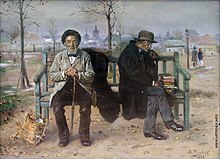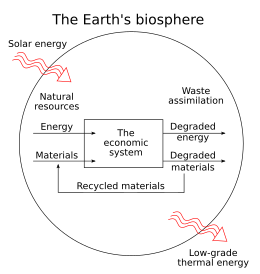Pessimism
This article needs additional citations for verification. (September 2022) |

Pessimism is a mental attitude in which an undesirable outcome is anticipated from a given situation. Pessimists tend to focus on the negatives of life in general. A common question asked to test for pessimism is "Is the glass half empty or half full?"; in this situation, a pessimist is said to see the glass as half empty, or in extreme cases completely empty, while an optimist is said to see the glass as half full. Throughout history, the pessimistic disposition has had effects on all major areas of thinking.[1]
Etymology
The term pessimism derives from the Latin word pessimus, meaning 'the worst'. It was first used by
As a psychological disposition
In the
Wender and Klein point out that pessimism can be useful in some circumstances: "If one is subject to a series of defeats, it pays to adopt a conservative game plan of sitting back and waiting and letting others take the risks. Such waiting would be fostered by a pessimistic outlook. Similarly if one is raking in the chips of life, it pays to adopt an expansive risk-taking approach, and thus maximize access to scarce resources."[6]
Criticism
Pragmatic criticism
Through history, some have concluded that a pessimistic attitude, although justified, must be avoided to endure. Optimistic attitudes are favored and of emotional consideration.
The economist
Other forms of pessimism
Philosophical pessimism
Philosophical pessimism is not a state of mind or a psychological disposition, but rather it is a worldview or philosophical position that assigns a negative value to life or existence. Philosophical pessimists commonly argue that the world contains an empirical prevalence of pains over pleasures, that existence is ontologically or metaphysically adverse to living beings, and that life is fundamentally meaningless or without purpose.[19]
Epistemological
There are several theories of epistemology which could arguably be said to be pessimistic in the sense that they consider it difficult or even impossible to obtain knowledge about the world. These ideas are generally related to nihilism, philosophical skepticism, and relativism.[citation needed]
Friedrich Heinrich Jacobi (1743–1819) analyzed rationalism, and in particular Immanuel Kant's "critical" philosophy to carry out a reductio ad absurdum[citation needed] according to which all rationalism reduces to nihilism, and thus it should be avoided and replaced with a return to some type of faith and revelation.[citation needed]
Political and cultural
Philosophical pessimism stands opposed to the optimism or even
There is another strain of thought generally associated with a pessimistic worldview, this is the pessimism of
Intellectuals such as
Many economic conservatives and
During the
Puolanka, a municipality located in the Kainuu region in the northern Finland, has been called the "most pessimistic municipality in Finland",[32] and in 2019, the municipality gained worldwide publicity when the BBC published a video about Puolanka, describing it as the "most pessimistic town in the world".[33] Pessimism has a long tradition in the Kainuu region, mostly because Kainuu was a poor region that had often suffered from famines in the late 19th century and early 20th century, which is why the region is also called a "hunger land".[34]
Technological and environmental
Technological pessimism is the belief that advances in science and technology do not lead to an improvement in the human condition. Technological pessimism can be said to have originated during the
Some social critics and environmentalists believe that
The presence of 7 billion people aiming for first-world comforts…is clearly incompatible with the homeostasis of climate but also with chemistry, biological diversity and the economy of the system.[37]
Some
An infamous anarcho-primitivist is
The Industrial Revolution and its consequences have been a disaster for the human race. They have greatly increased the life-expectancy of those of us who live in "advanced" countries, but they have destabilized society, have made life unfulfilling, have subjected human beings to indignities, have led to widespread psychological suffering (in the Third World to physical suffering as well) and have inflicted severe damage on the natural world. The continued development of technology will worsen the situation. It will certainly subject human beings to greater indignities and inflict greater damage on the natural world, it will probably lead to greater social disruption and psychological suffering, and it may lead to increased physical suffering even in "advanced" countries.
One of the most radical pessimist organizations is the
Pope Francis' controversial 2015 encyclical on ecological issues is rife with pessimistic assessments of the role of technology in the modern world.
Entropy pessimism

"Entropy pessimism" represents a special case of technological and environmental pessimism, based on thermodynamic principles.[39]: 116 According to the first law of thermodynamics, matter and energy is neither created nor destroyed in the economy. According to the second law of thermodynamics—also known as the entropy law—what happens in the economy is that all matter and energy is transformed from states available for human purposes (valuable natural resources) to states unavailable for human purposes (valueless waste and pollution). In effect, all of man's technologies and activities are only speeding up the general march against a future planetary "heat death" of degraded energy, exhausted natural resources and a deteriorated environment—a state of maximum entropy locally on earth; "locally" on earth, that is, when compared to the heat death of the universe, taken as a whole.
The term "entropy pessimism" was coined to describe the work of
Among other matters, the entropy pessimism position is concerned with the existential impossibility of allocating Earth's finite stock of mineral resources evenly among an unknown number of present and future generations. This number of generations is likely to remain unknown to us, as there is no way—or only little way—of knowing in advance if or when mankind will ultimately face extinction. In effect, any conceivable intertemporal allocation of the stock will inevitably end up with universal economic decline at some future point.[43]: 369–371 [44]: 253–256 [45]: 165 [46]: 168–171 [47]: 150–153 [48]: 106–109 [42]: 546–549 [49]: 142–145
Entropy pessimism is a widespread view in ecological economics and in the degrowth movement.
Legal
Bibas writes that some
See also
Notes
- ^ ISBN 978-0-7486-0936-9.
- ^ ISBN 978-0-6911-4112-1.
- ISBN 978-0-312-67684-1.
- PMID 3985195
- PMID 4436473
- ^ Wender, PH; Klein, DF (1982), Mind, Mood and Medicine, New American Library
- ^ Michau, Michael R. ""Doing, Suffering, and Creating": William James and Depression" (PDF). web.ics.purdue.edu. Archived from the original (PDF) on 2009-02-26. Retrieved 2020-04-22.
- ^ Justin Fox (May 26, 2010). "What Exactly is Nouriel Roubini Good For?", Harvard Business Review.
- Little, Brown.
- ^ Thomas I. Palley (2013). From Financial Crisis to Stagnation; The Destruction of Shared Prosperity and the Role of Economics.
- North Bay Business Journal.
- ^ Jayson MacLean (May 6, 2020). "Nouriel Roubini warns of Great Depression just like he did last year (and the year before that)," Cantech Letter.
- ^ "Market gurus:Overrated Dr Roubini flops—again," Moneylife, March 10, 2011.
- AZ Central, May 8, 2014.
- ^ Joe Keohane (January 9, 2011). "That guy who called the big one? Don’t listen to him." The Boston Globe.
- ^ Tony Robbins, Peter Mallouk (2017). Unshakeable; Your Financial Freedom Playbook
- ^ Emma Brockes (January 23, 2009). "He told us so," The Guardian.
- ^ Helaine Olen (March 30, 2009). "The Prime of Mr. Nouriel Roubini", Entrepreneur.
- ^ For discussions around the views and arguments of philosophical pessimism see:
- ISBN 978-0-521-87184-6.
- ISBN 978-0-521-87034-4.
- Benatar, David (2017). The Human Predicament: A Candid Guide to Life's Biggest Questions. Oxford: Oxford University Press. ISBN 978-0-19-063381-3.
- Ligotti, Thomas (2011). The Conspiracy Against the Human Race: A Contrivance of Horror. New York: Hippocampus Press. OCLC 805656473.
- Saltus, Edgar (2012) [1885]. The Philosophy of Disenchantment. Project Gutenberg.
- Coates, Ken (2014). Anti-Natalism: Rejectionist Philosophy from Buddhism to Benatar. First Edition Design Pub. ISBN 978-1-62287-570-2.
- Lugt, Mara van der (2021). Dark Matters: Pessimism and the Problem of Suffering. Princeton, New Jersey: Princeton University Press. ISBN 978-0-691-20662-2.
- Sully, James (1877). Pessimism: A History and a Criticism. London: Henry S. King & Co.
- ^ Cioran, Emil. A short history of decay, pg 146
- ^ Cioran, Emil. A short history of decay, pg 178
- ISBN 978-94-009-3485-6. Retrieved 2023-03-20.
- ISBN 978-0-226-49697-9. Retrieved 2023-03-20.
- ^ Trollope, Anthony (1 January 2003) [1880]. "62: The Brake Country". The Duke's Children. Project Gutenberg. Retrieved 31 July 2023.
- ^
Compare:
Holmes, Jack E.; Engelhardt, Michael J.; Elder, Robert E. (1991). American Government: Essentials & Perspectives. New York: McGraw-Hill. p. 16. ISBN 9780070297678. Retrieved 31 July 2023.
[Those] more sympathetic to libertarian views on the role of government have been in the position of fighting a holding action against the growth of government [...].
- S2CID 156005171
- S2CID 5989051
- ^ Pessimism Porn: A soft spot for hard times, Hugo Lindgren, New York, February 9, 2009; accessed July 8, 2012
- ^ Pessimism Porn? Economic Forecasts Get Lurid, Dan Harris, ABC News, April 9, 2009; accessed July 8, 2012
- ISBN 0739166220
- ^ Pessimism Porn: Titillatingly bleak media reports, Ben Schott, New York Times, February 23, 2009; accessed July 8, 2012
- ^ "Pessimistinen Puolanka". Yle (in Finnish). 3 January 2020. Retrieved 25 November 2023.
- ^ "The world's most pessimistic town". BBC. 1 November 2019. Retrieved 25 November 2023.
- ISBN 952-91-0373-5
- ^ "Romanticism". Wsu.edu. Archived from the original on 2008-07-18. Retrieved 2010-06-02.
- ^ The New York Review of Books Gray, John. "The Global Delusion, John Gray".
{{cite magazine}}: Cite magazine requires|magazine=(help) - ^ a b The New York Review of Books Flannery, Tim. "A Great Jump to Disaster?, Tim Flannery".
{{cite magazine}}: Cite magazine requires|magazine=(help) - ^ The Washington Post: Unabomber Special Report: INDUSTRIAL SOCIETY AND ITS FUTURE
- ^ a b
S2CID 154728333.
- ^
Georgescu-Roegen, Nicholas (1971). The Entropy Law and the Economic Process (Full book accessible at Scribd). Cambridge, Massachusetts: Harvard University Press. ISBN 978-0674257801.
- ^
S2CID 13441670. Retrieved 23 November 2016.
- ^ a b Kerschner, Christian (2010). "Economic de-growth vs. steady-state economy" (PDF). .
- ^
Daly, Herman E., ed. (1980). Economics, Ecology, Ethics. Essays Towards a Steady-State Economy (PDF contains only the introductory chapter of the book) (2nd ed.). San Francisco: W.H. Freeman and Company. ISBN 978-0716711780.
- ^
ISBN 978-0670297177. Archived from the original(PDF contains only the title and contents pages of the book) on 2016-10-18.
- ^
ISBN 978-0803916487.
- ^
ISBN 978-0631171461.
- ^ Gowdy, John M.; Mesner, Susan (1998). "The Evolution of Georgescu-Roegen's Bioeconomics" (PDF). Review of Social Economy. 56 (2): 136–156. .
- ^
Schmitz, John E.J. (2007). The Second Law of Life: Energy, Technology, and the Future of Earth As We Know It (Author's science blog, based on his textbook). Norwich: William Andrew Publishing. ISBN 978-0815515371.
- ^
Perez-Carmona, Alexander (2013). "Growth: A Discussion of the Margins of Economic and Ecological Thought". In Meuleman, Louis (ed.). Transgovernance. Advancing Sustainability Governance (Article accessible at SlideShare). Heidelberg: Springer. pp. 83–161. ISBN 9783642280085.
- ^ Bibas, Stephanos (Jun 2004), Plea Bargaining outside the Shadow of Trial, vol. 117, Harvard Law Review, pp. 2463–2547.
Further reading
- Schmitt, Mark, Spectres of Pessimism: A Cultural Logic of the Worst, Palgrave, 2023, ISBN 978-3-031-25351-5
- Slaboch, Matthew W., A Road to Nowhere: The Idea of Progress and Its Critics, The University of Pennsylvania Press, 2018, ISBN 0-812-24980-1
External links
- . Encyclopædia Britannica. Vol. 21 (11th ed.). 1911.
- Contestabile, Bruno (2016). "The Denial of the World from an Impartial View". Contemporary Buddhism. 17: 49–61. S2CID 148168698.
- Pessimism by Mara Van der Lugt in The Philosopher.


